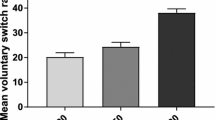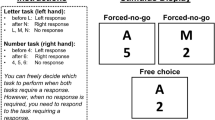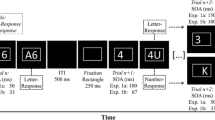Abstract
Cognitive flexibility is commonly studied using the cued and voluntary task-switching paradigms. Given that the cued task contains more exogenous control processes, and the voluntary choice task includes more endogenous control processes, some control transitions between the cued and voluntary choice trials could exist. However, the transitions between the cued and voluntary choice tasks have been largely ignored by prior works. Thus, to fill this gap in the literature, we used a hybrid task-switching paradigm by mixing a cued task with a voluntary task to probe control transitions. We conducted two experiments; each comprised of trials that were grouped into four types of control transitions (i.e., voluntary → cued, voluntary → voluntary, cued → voluntary, and cued → cued). We found a cost associated with control switch and that the control switch possibly facilitated cognitive flexibility, as indicated by the impaired task switch cost and increased voluntary switch rate compared with the control repeat. In addition, we found an asymmetrical control cost between the transition of cued and voluntary choice tasks, with a larger control cost when switching from a difficult to an easier control mode. We also found that the task repeat and task switch trials had an opposite, asymmetrical control cost pattern and were differently modulated by switch probability. Therefore, the findings of the present study broaden our understanding of cognitive flexibility and provide new insights into its underlying mechanisms.




Similar content being viewed by others
References
Allport, D. A., Styles, E. A., & Hsieh, S. (1994). Shifting intentional set: Exploring the dynamic control of tasks. https://doi.org/10.7551/mitpress/1478.003.0025
Arrington, C. M., & Logan, G. D. (2004). The cost of a voluntary task switch. Psychological Science, 15(9), 610–615. https://doi.org/10.1111/j.0956-7976.2004.00728.x
Arrington, C. M., & Logan, G. D. (2005). Voluntary task switching: chasing the elusive homunculus. Journal of Experimental Psychology: Learning, Memory, and Cognition, 31(4), 683. https://doi.org/10.1037/0278-7393.31.4.683
Braem, S., & Egner, T. (2018). Getting a grip on cognitive flexibility. Current Directions in Psychological Science, 27(6), 470–476. https://doi.org/10.1177/0963721418787475
Campbell, J. I., & Thompson, V. A. (2012). MorePower 6.0 for ANOVA with relational confidence intervals and Bayesian analysis. Behavior research methods, 44(4), 1255–1265. https://doi.org/10.3758/s13428-012-0186-0
Chen, P., & Hsieh, S. (2015). At will or not at will: Electrophysiological correlates of preparation for voluntary and instructed task-switching paradigms. Psychonomic bulletin & review, 22(5), 1389–1402. https://doi.org/10.3758/s13423-014-0789-9
Chiu, Y.-C., Froeber, K., & Egner, T. (2020). Item-Specific Priming of Voluntary Task Switches. Journal of Experimental Psychology-Human Perception and Performance, 46(4), 434–441. https://doi.org/10.1037/xhp0000725
Dajani, D. R., & Uddin, L. Q. (2015). Demystifying cognitive flexibility: Implications for clinical and developmental neuroscience. Trends in neurosciences, 38(9), 571–578. https://doi.org/10.1016/j.tins.2015.07.003
de Jong, R. (1995). Strategical determinants of compatibility effects with task uncertainty. Acta psychologica, 88(3), 187–207. https://doi.org/10.1016/0001-6918(94)E0067-P
Demanet, J., De Baene, W., Arrington, C. M., & Brass, M. (2013). Biasing free choices: the role of the rostral cingulate zone in intentional control. NeuroImage, 72, 207–213. https://doi.org/10.1016/j.neuroimage.2013.01.052
Egner, T. (2017). The Wiley handbook of cognitive control. John Wiley & Sons. https://doi.org/10.1002/9781118920497
Ellefson, M. R., Shapiro, L. R., & Chater, N. (2006). Asymmetrical switch costs in children. Cognitive Development, 21(2), 108–130. https://doi.org/10.1016/j.cogdev.2006.01.002
Forstmann, B. U., Brass, M., Koch, I., & Von Cramon, D. Y. (2006). Voluntary selection of task sets revealed by functional magnetic resonance imaging. Journal of Cognitive Neuroscience, 18(3), 388–398. https://doi.org/10.1162/jocn.2006.18.3.388
Froeber, K., & Dreisbach, G. (2016). How Sequential Changes in Reward Magnitude Modulate Cognitive Flexibility: Evidence From Voluntary Task Switching. Journal of Experimental Psychology-Learning Memory and Cognition, 42(2), 285–295. https://doi.org/10.1037/xlm0000166
Froeber, K., & Dreisbach, G. (2017). Keep flexible - Keep switching! The influence of forced task switching on voluntary task switching. Cognition, 162, 48–53. https://doi.org/10.1016/j.cognition.2017.01.024
Froeber, K., Raith, L., & Dreisbach, G. (2018). The dynamic balance between cognitive flexibility and stability: the influence of local changes in reward expectation and global task context on voluntary switch rate. Psychological Research-Psychologische Forschung, 82(1), 65–77. https://doi.org/10.1007/s00426-017-0922-2
Goschke, T. (2000). Intentional reconfiguration and involuntary persistence in task set switching. Control of cognitive processes: Attention and performance XVIII, 18, 331. https://doi.org/10.7551/mitpress/1481.003.0023
Hübner, M., Kluwe, R. H., Luna-Rodriguez, A., & Peters, A. (2004). Response selection difficulty and asymmetrical costs of switching between tasks and stimuli: no evidence for an exogenous component of task-set reconfiguration. Journal of Experimental Psychology: Human Perception and Performance, 30(6), 1043. https://doi.org/10.1037/0096-1523.30.6.1043
Janczyk, M., Nolden, S., & Jolicoeur, P. (2015). No differences in dual-task costs between forced-and free-choice tasks. Psychological Research, 79(3), 463–477. https://doi.org/10.1007/s00426-014-0580-6
Jiang, J., Wagner, A. D., & Egner, T. (2018). Integrated externally and internally generated task predictions jointly guide cognitive control in prefrontal cortex. Elife, 7, e39497. https://doi.org/10.7554/eLife.39497
Kessler, Y., Shencar, Y., & Meiran, N. (2009). Choosing to switch: Spontaneous task switching despite associated behavioral costs. Acta psychologica, 131(2), 120–128. https://doi.org/10.1016/j.actpsy.2009.03.005
Kiesel, A., Steinhauser, M., Wendt, M., Falkenstein, M., Jost, K., Philipp, A. M., & Koch, I. (2010). Control and interference in task switching-A review. Psychological bulletin, 136(5), 849. https://doi.org/10.1037/a0019842
Laurent, L., Millot, J.-L., Andrieu, P., Camos, V., Floccia, C., & Mathy, F. (2016). Inner speech sustains predictable task switching: direct evidence in adults. Journal of Cognitive Psychology, 28(5), 585–592. https://doi.org/10.1080/20445911.2016.1164173
Liefooghe, B., Demanet, J., & Vandierendonck, A. (2009). Is advance reconfiguration in voluntary task switching affected by the design employed? Quarterly Journal of Experimental Psychology, 62(5), 850–857. https://doi.org/10.1080/17470210802570994
Logan, G. D., & Bundesen, C. (2003). Clever homunculus: Is there an endogenous act of control in the explicit task-cuing procedure? Journal of Experimental Psychology: Human Perception and Performance, 29(3), 575. https://doi.org/10.1037/0096-1523.29.3.575
Masson, M. E. J., & Carruthers, S. (2014). Control processes in voluntary and explicitly cued task switching. Quarterly Journal of Experimental Psychology, 67(10), 1944–1958. https://doi.org/10.1080/17470218.2013.879390
Meiran, N. (1996). Reconfiguration of processing mode prior to task performance. Journal of Experimental Psychology: Learning, Memory, and Cognition, 22(6), 1423. https://doi.org/10.1037/0278-7393.22.6.1423
Miller, E. K., & Cohen, J. D. (2001). An integrative theory of prefrontal cortex function. Annual review of neuroscience, 24(1), 167–202. https://doi.org/10.1146/annurev.neuro.24.1.167
Millington, R. S., Poljac, E., & Yeung, N. (2013). Between-task competition for intentions and actions. Quarterly Journal of Experimental Psychology, 66(8), 1504–1516. https://doi.org/10.1080/17470218.2012.746381
Mittelstädt, V., Dignath, D., Schmidt-Ott, M., & Kiesel, A. (2018a). Exploring the repetition bias in voluntary task switching. Psychological Research, 82(1), 78–91. https://doi.org/10.1007/s00426-017-0911-5
Mittelstädt, V., Miller, J., & Kiesel, A. (2018b). Trading off switch costs and stimulus availability benefits: An investigation of voluntary task-switching behavior in a predictable dynamic multitasking environment. Memory & cognition, 46(5), 699–715. https://doi.org/10.3758/s13421-018-0802-z
Monsell, S. (2003). Task switching. Trends in cognitive sciences, 7(3), 134–140. https://doi.org/10.1016/S1364-6613(03)00028-7
Orr, J. M., & Banich, M. T. (2014). The neural mechanisms underlying internally and externally guided task selection. NeuroImage, 84, 191–205. https://doi.org/10.1016/j.neuroimage.2013.08.047
Orr, J. M., Imburgio, M. J., Bernard, J. A., & Banich, M. T. (2019). Striatal-frontal network activation during voluntary task selection under conditions of monetary reward. Cognitive, Affective, & Behavioral Neuroscience, 19(3), 568–585. https://doi.org/10.3758/s13415-019-00689-0
Ouellette, J. A., & Wood, W. (1998). Habit and intention in everyday life: The multiple processes by which past behavior predicts future behavior. Psychological bulletin, 124(1), 54. https://doi.org/10.1037/0033-2909.124.1.54
Poljac, E., Haartsen, R., van der Cruijsen, R., Kiesel, A., & Poljac, E. (2018). Task intentions and their implementation into actions: cognitive control from adolescence to middle adulthood. Psychological Research-Psychologische Forschung, 82(1), 215–229. https://doi.org/10.1007/s00426-017-0927-x
Poljac, E., Poljac, E., & Yeung, N. (2012). Cognitive control of intentions for voluntary actions in individuals with a high level of autistic traits. Journal of autism and developmental disorders, 42(12), 2523–2533. https://doi.org/10.1007/s10803-012-1509-9
Qiao, L., Xu, M., Luo, X., Zhang, L., Li, H., & Chen, A. (2020). Flexible adjustment of the effective connectivity between the fronto-parietal and visual regions supports cognitive flexibility. NeuroImage, 117158. https://doi.org/10.1016/j.neuroimage.2020.117158
Qiao, L., Zhang, L., Chen, A., & Egner, T. (2017). Dynamic trial-by-trial recoding of task-set representations in the frontoparietal cortex mediates behavioral flexibility. Journal of Neuroscience, 37(45), 11037–11050. https://doi.org/10.1523/JNEUROSCI.0935-17.2017
Rouder, J. N., Speckman, P. L., Sun, D., Morey, R. D., & Iverson, G. (2009). Bayesian t tests for accepting and rejecting the null hypothesis. Psychonomic bulletin & review, 16(2), 225–237. https://doi.org/10.3758/PBR.16.2.225
Ruge, H., Brass, M., Koch, I., Rubin, O., Meiran, N., & von Cramon, D. Y. (2005). Advance preparation and stimulus-induced interference in cued task switching: further insights from BOLD fMRI. Neuropsychologia, 43(3), 340–355. https://doi.org/10.1016/j.neuropsychologia.2004.06.014
Ruthruff, E., Remington, R. W., & Johnston, J. C. (2001). Switching between simple cognitive tasks: The interaction of top-down and bottom-up factors. Journal of Experimental Psychology: Human Perception and Performance, 27(6), 1404. https://doi.org/10.1037/0096-1523.27.6.1404
Sommer, A., & Lukas, S. (2018). Action-effect associations in voluntary and cued task-switching. Frontiers in psychology, 8, 2233. https://doi.org/10.3389/fpsyg.2017.02233
Vandierendonck, A., Liefooghe, B., & Verbruggen, F. (2010). Task switching: interplay of reconfiguration and interference control. Psychological bulletin, 136(4), 601. https://doi.org/10.1037/a0019791
Wirth, R., Janczyk, M., & Kunde, W. (2018). Effect monitoring in dual-task performance. Journal of Experimental Psychology: Learning, Memory, and Cognition, 44(4), 553. https://doi.org/10.1037/xlm0000474
Yeung, N. (2010). Bottom-up influences on voluntary task switching: The elusive homunculus escapes. Journal of Experimental Psychology: Learning, Memory, and Cognition, 36(2), 348. https://doi.org/10.1037/a0017894
Yeung, N., & Monsell, S. (2003). Switching between tasks of unequal familiarity: The role of stimulus-attribute and response-set selection. Journal of Experimental Psychology: Human Perception and Performance, 29(2), 455. https://doi.org/10.1037/0096-1523.29.2.455
Acknowledgments
The study was supported by the National Natural Science Foundation of China (grant number 31900800), the Natural Science Foundation of Shenzhen (grant number JCYJ20190808123211511), and the Natural Science Foundation of SZU (grant number 2019112). The authors declare no conflict of interest.
Availability of data and material
The datasets generated during and/or analysed during the current study are available from the corresponding author on reasonable request.
Funding
The study was supported by the National Natural Science Foundation of China (grant number 31900800), the Natural Science foundation of Shenzhen (grant number JCYJ20190808123211511), and the Natural Science Foundation of SZU (grant number 2019112).
Author information
Authors and Affiliations
Corresponding author
Ethics declarations
Not applicable.
Conflicts of interest/Competing interest
None.
Additional information
Publisher’s Note
Springer Nature remains neutral with regard to jurisdictional claims in published maps and institutional affiliations.
Rights and permissions
About this article
Cite this article
Qiao, L., Zhang, L., Li, H. et al. Control transition between cued and voluntary choice tasks: Effects on cognitive flexibility. Curr Psychol 42, 14812–14822 (2023). https://doi.org/10.1007/s12144-021-02680-w
Accepted:
Published:
Issue Date:
DOI: https://doi.org/10.1007/s12144-021-02680-w




